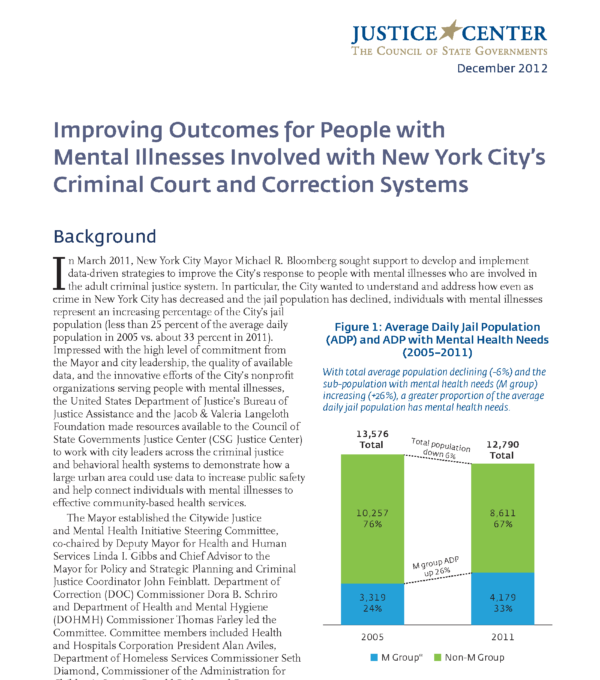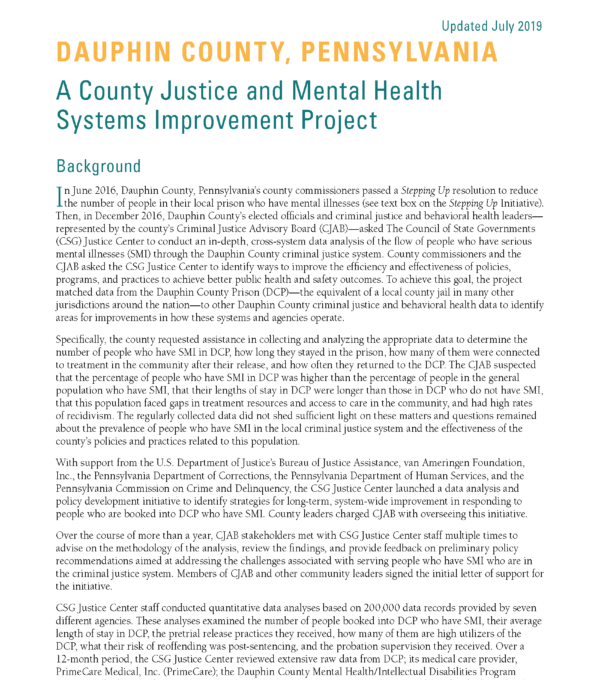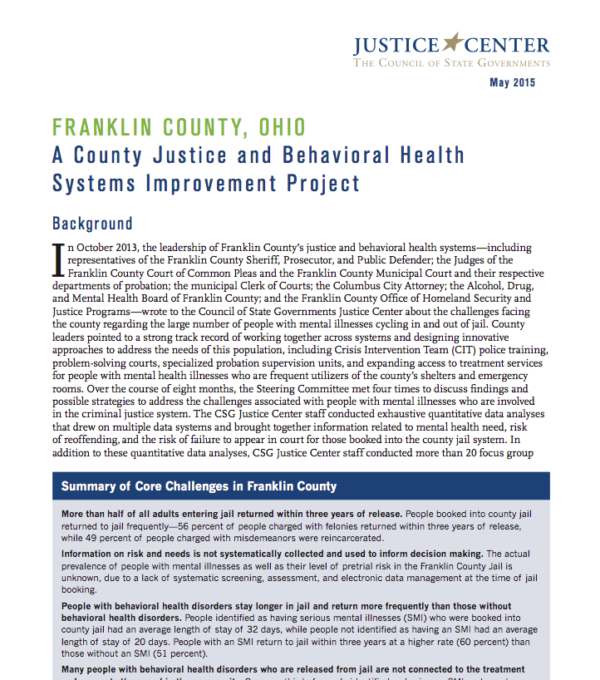County Justice and Behavioral Health Systems Improvement Project
County Justice and Behavioral Health Systems Improvement Project
The County Justice and Behavioral Health Systems Improvement Project is a national initiative that uses qualitative and quantitative research to improve outcomes for people with mental illnesses in county criminal justice systems throughout the country. The project helps to bring concepts from the CSG Justice Center’s Criminogenic Risk and Behavioral Health Needs Framework to local criminal justice systems that want to improve their responses to individuals with mental health needs, many of whom also have a co-occurring substance use disorder.
On March 15, 2013, the Bureau of Justice Assistance (BJA), the Substance Abuse and Mental Health Services Administration (SAMHSA), and the National Institute of Corrections (NIC) hosted leaders from the fields of criminal justice and behavioral health from 70 nonprofit, association, and advocacy organizations. The summit highlighted the substantial progress in improving outcomes for individuals with mental illnesses in the criminal justice system.
To position counties for consideration as demonstration sites, county leadership should provide the CSG Justice Center with:
- Written support for the project and for collecting and analyzing criminal justice and behavioral health data from county agencies
- Evidence that the appropriate data is available to develop an indicator of behavioral needs for individuals in the criminal justice system
- Commitment to assist with convening, and participation in, county leadership team meetings
Current Demonstration Sites
Bexar County (San Antonio, TX)
In 2013, Bexar County (San Antonio), Texas, was selected to serve as a County Justice and Behavioral Health Systems Demonstration Site. Demonstration sites receive in-depth technical assistance from the CSG Justice Center to pursue goals such as increasing public safety, reducing jail costs, and helping connect individuals with mental and substance use disorders to effective community-based health services.
The leaders from Bexar County’s criminal justice and behavioral health systems have made a strong commitment to collaborate on a data-driven approach to policy development. They had already identified improving mental health services as a top county priority and requested assistance to ensure that existing county investments, as well as several federal grants, were being deployed for the greatest positive impact.
Bexar County officials worked closely with the CSG Justice Center to identify priorities for analysis, review preliminary findings, and develop practical policy recommendations, and this collaborative effort has yielded promising developments. At the end of September, for instance, Bexar County’s district attorney, Susan Reed, launched a new pretrial diversion program.
Hillsborough County (Manchester, NH)
Hillsborough County (Manchester), New Hampshire, officials took action after learning that the average length of stay in Hillsborough County for pretrial detainees who had a serious mental illness was three times longer than for other pretrial detainees.
They set up a task force that determined, with the help of a CSG Justice Center analysis, that defendants with serious mental illnesses were often unaware during arraignment of the existence or advantages of the county’s mental health court. Furthermore, judges were understandably reluctant to refer a defendant to mental health court until the individual could consult an attorney, because participation in a mental health court can extend the period of court supervision beyond a traditional sentence. The task force took steps to ensure people with serious mental illnesses are assigned defense counsel prior to arraignment.
Members also focused on the waiting period before a defendant received an evaluation of competency to stand trial, which could last as long as three months. The task force partnered with disability rights advocates and the Chief Justice’s Task Force on Mental Health and Criminal Justice to push for statutory change requiring a maximum of 60 days from initial request to evaluation (the cap had been 90 days). In its 2009 session, the state legislature amended the relevant statute.
The task force also recommended that the county jail adopt a tool, to be administered at intake, for assessing an individual’s risk of recidivating. The results of this risk assessment, coupled with recommendations from jail officials, would inform judges’ decisions about whether they issue bail and refer a person to one of the two programs.
New York County (New York, NY)
On December 23, 2012, the CSG Justice Center released Improving Outcomes for People with Mental Illnesses Involved with New York City’s Criminal Court and Correction Systems. This report, commissioned by Mayor Bloomberg and completed with support from the United States Department of Justice Bureau of Justice Assistance and the Jacob & Valeria Langeloth Foundation, presents the results of an unprecedented analysis of the mental health needs, criminogenic risk, and risk of failure to appear in court for individuals admitted to the New York City Department of Correction. The report’s findings are based on tens of thousands of records from city, state, and nonprofit agencies and show important differences in outcomes for those with mental illnesses entering the New York City jail system. Based on the study’s findings and with the guidance of the Mayor’s Criminal Justice and Mental Health Initiative Steering Committee, the report also identifies a set of policy recommendations and strategies to determine the levels of risks and needs for individuals entering the jail system; to provide appropriate pretrial, plea, and sentencing options; and to establish centralized resource hubs for coordinating assessment information and community-based supervision and treatment options. As a result of this initiative, Mayor Bloomberg announced that New York City will create “Court-based Intervention and Resource Teams” (CIRTs) to serve over 3,000 clients with mental health needs annually. New York City now serves as a national model for how a large urban area can use data to develop policies to increase public safety, reduce jail costs, and help connect individuals with mental illnesses to effective community-based health services.
During his December 23, 2012 radio address, New York City Mayor Bloomberg discussed the City’s ongoing efforts to improve public safety, including the launch of an initiative to serve people with mental health needs who are involved with the criminal justice system.
On September 27, 2011, New York City Mayor Bloomberg announced a new initiative to address high rates of mentally ill in New York City jails.
Improving Outcomes for People with Mental Illnesses Involved with New York City’s Criminal Court and Correction Systems
To download a PDF of the report’s summary, click here.
Dauphin County (Harrisburg, PA)
As part of the national Stepping Up initiative, on December 15, 2016, leaders in Dauphin County, Pennsylvania, launched a data-driven project intended to reduce the number of people with mental illnesses and co-occurring substance use disorders in the county prison.
Dauphin County—home to the state’s capitol city of Harrisburg—received intensive technical assistance from the CSG Justice Center that guided the county in answering four key questions: How many people with mental illnesses are in the county prison? What is their average length of stay? Are they being connected with behavioral health treatment upon release? What is their rate of recidivism?
The CSG Justice Center used their findings to develop policy and programming recommendations that were presented to the Dauphin County Criminal Justice Advisory Board and County Commissioners in 2017.
Franklin County (Columbus, OH)
In 2014, the Franklin County (Columbus), Ohio, Criminal Justice Planning Board was selected to serve as a County Justice and Behavioral Health Systems Demonstration Site. Demonstration sites receive in-depth technical assistance from the CSG Justice Center to pursue goals such as increasing public safety, reducing jail costs, and helping connect individuals with mental and substance use disorders to effective community-based health services.
Franklin County was selected because of the strength of cooperation between its various criminal-justice-related agencies. The Franklin County Sheriff’s Office; the Franklin County Board of Commissioners; the Alcohol, Drug, and Mental Health Board of Franklin County; the Franklin County Office of Homeland Security and Justice Programs; the Columbus City Attorney’s Office; the Franklin County Prosecutor and Public Defender offices; and leadership from the Franklin County Municipal and Common Pleas Courts and Probation departments all worked together on the project.
An extensive data analysis coupled with over 50 in-person interviews with local and state leaders led to the identification of key recommendations for reducing the number of people with behavioral health disorders cycling in and out of jail.
To download a PDF of the report’s summary, click here.
To download a PDF of the full report, click here.
Johnson County (Olathe, KS)
Johnson County (Olathe), Kansas, officials recognized the number of people with mental illnesses in their justice system was growing, and so they came together in 2010 to develop a strategy for using data to develop a system-wide response. They created maps showing how individuals flowed through their justice system, which provided a way for team members (who called their approach the “Intercept Project,” after a tool developed by the SAMHSA National GAINS Center) to visualize data and determine priorities.
After significant analysis, Johnson County decided to adopt new screening protocols at jail intake. They established a process to cross-reference criminal justice data with data collected by the mental health system to identify overlapping populations, which helps in classification and case staffing decisions, medication management, and psychiatric treatment.
Officials also realized that individuals who were referred to mental health services within the county’s jail made up a significant percentage of those who were frequently and repeatedly jailed. They now assess these individuals for serious mental illness and add repeated bookings as a criterion for eligibility for diversion. Johnson County conducts joint case planning between the jail and the individual’s mental health provider, a community mental health center, or a family member/significant other.
Officials also discovered that a large portion of the people with mental illnesses in their jail weren’t Johnson County residents. Of the 1,411 individuals flagged for a mental health referral between January and April 2010, for example, only 817 (58 percent) were actually from Johnson County. Most were from neighboring Wyandotte County. Now, when an individual from Wyandotte is about to be released from the jail in Johnson County, Wyandotte County officials are included in the reentry planning process.
Salt Lake County (Salt Lake City, UT)
An extensive data analysis coupled with over 50 in-person interviews with stakeholders in Salt Lake County’s justice and behavioral health systems led to the identification of key recommendations improve outcomes for people involved with the county’s criminal justice system, particular those with behavioral health disorders.
To download a PDF of the report’s summary, click here.
To download a PDF of the full report, click here.
Highlights

No one needed to tell Hillsborough County Jail Superintendent James O’Mara or…
Read More
After years of pursuing separate approaches to providing supervision and treatment, Kansas…
Read MoreIn response to growing calls for police reform in New Jersey, particularly following the shootings of Najee Seabrooks…
Read More Three Things to Know About New Jersey’s Groundbreaking Community Response Legislation
Three Things to Know About New Jersey’s Groundbreaking Community Response Legislation
In response to growing calls for police reform in New Jersey, particularly…
Read More Apply Now: Join a Learning Community for Community and Crisis Response Teams to Improve Responses to Youth
Read More
Apply Now: Join a Learning Community for Community and Crisis Response Teams to Improve Responses to Youth
Read More
 Apply Now: Join a Learning Community Focused on Substance Use and Overdose Community Response Programs
Read More
Apply Now: Join a Learning Community Focused on Substance Use and Overdose Community Response Programs
Read More
















